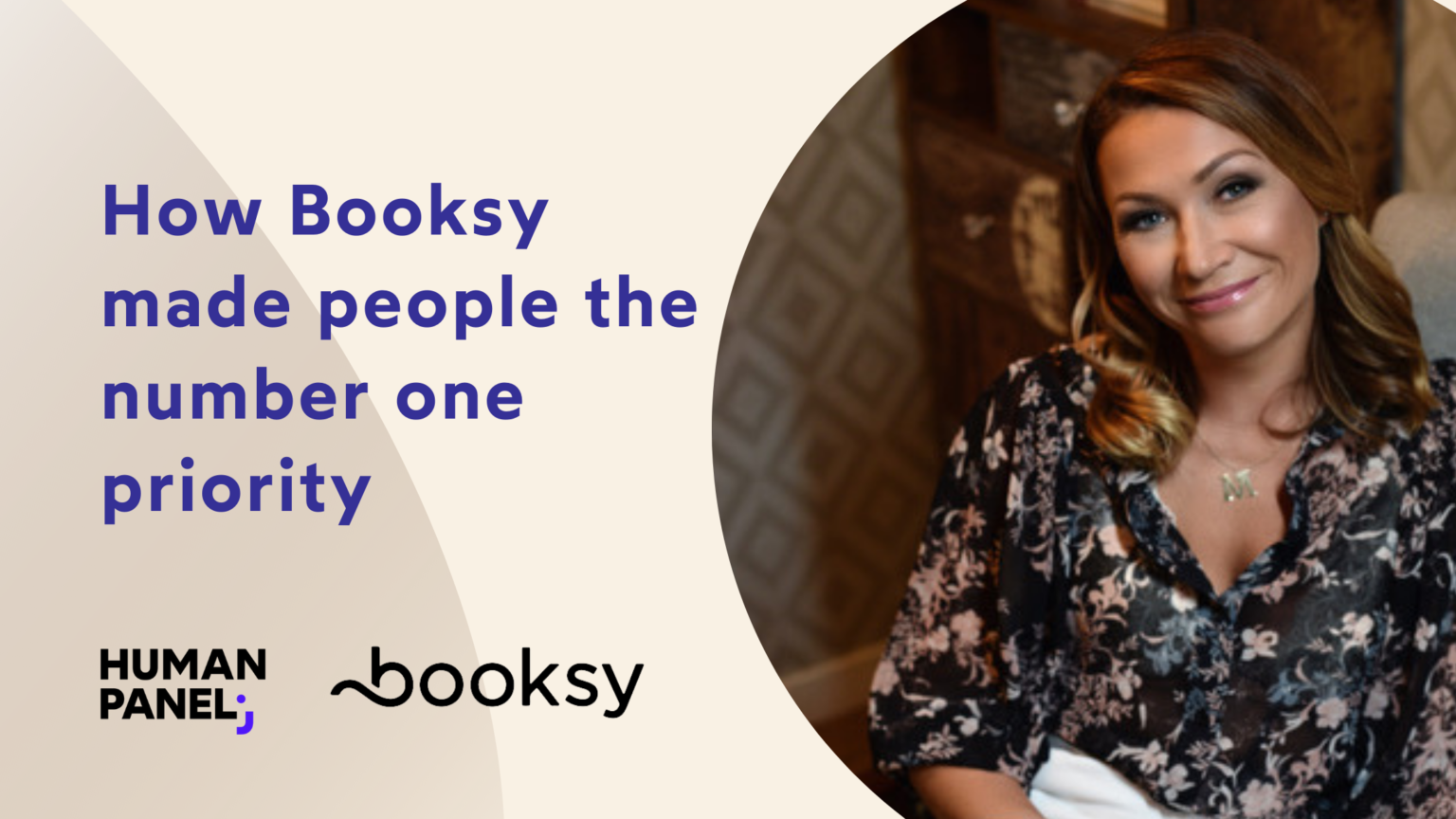How Booksy made people the number one priority (and it’s not just a buzzword)

How can you prioritize and truly care about the people in your business? We spoke with Małgorzata Szturmowicz, CFO at Booksy.
Booksy is one of the best known success stories of recent years. Today it is the leading beauty marketplace for finding, scheduling and managing appointments. The company is headquartered in the United States and has offices in 6 countries. It employs over 1000 people who have the unique opportunity to grow in a value-based culture.
What makes Booksy a special place to work? Human Panel had the opportunity to speak with Małgorzata Szturmowicz, CFO at Booksy.
Human Panel: Before we started the interview, you told me that people should be the most valuable asset of any company. Is that really the case in today’s world? Are they the top priority?
Małgorzata Szturmowicz, CFO at Booksy: During my professional career, I met many companies that were vocal about the importance of their employees. They went to great lengths to create the image of an employee-centric company, but the reality was quite different. It’s hard to generalize – but I think that those who do not put their employees first will lose the most in the future.
The success of a company depends on many factors. Even a great product or service can be copied or improved upon. So what gives a company a competitive advantage is hidden beneath the surface. And if you look there, you may see that behind that fantastic product are people – along with their expertise, commitment and intellect. People create your value and I believe that there is no other way to achieve that value than to put people first.
What does it take for “putting people first” to become a real thing and not just an empty buzzword?
For me, it all starts with the hiring process. Jim Collins once said, “It’s not first about where you want the bus to go and then finding people to get it there. It’s about getting the right people on the bus, putting them in the right seats, and then getting the wrong people off the bus.” It means you have to build a company with people who are aligned with the company’s values and vision.
At Booksy, for example, we follow four core company values (People First, Act Like An Owner, Work As A Team, Shoot For The Moon). I have seen high-level managers fired despite their high performance at the operational level. The reason was that their work style did not put people first. And because we work in an open and transparent culture, there were no roadblocks in communication that someone was acting inappropriately.
Another important point is inclusion. Today, many companies pride themselves on diversity, but diversity is not enough. You can have a great gender balance, but the key is to make all your employees feel part of the company.
Getting back to recruitment: You need to hire the best fit. That way, those who are already with the company will see that you are hiring motivated and competent people. And if someone valuable leaves the company, you need to prevent the loss of morale and keep the spirits up.
These three things: the right people, open communication and integration are a good start to making people your priority.
Małgorzata Szturmowicz, CFO aT BOOKSY
In cases like this, do you think the example comes from the top? Do C-level executives need to model the company values first before asking others to follow?
From what I have seen, we are slowly moving from a control/power leadership to a more value leadership style. In the past, leaders pretended to be fearless, no matter how good the reason for their fear, or to act like a know-it-all, no matter how obvious it is that neither you nor anyone else has all the answers. Today, we are moving toward values-based leadership, where you act on your values. With such an attitude, you can admit, “I am sorry, I made a mistake,” “I do not know, please help me with this.” Once people know you are competent, you come across as stronger, not weaker, when you are vulnerable and open.
Leadership is not a beauty contest. It’s about doing important work on behalf of other. It’s about encouraging people to take on challenges and not punishing them when they fail.
Małgorzata Szturmowicz, CFO aT BOOKSY
That’s what makes a true leader: having a sense of other people’s needs and embedding values in companies DNA. That’s what helps build a values-driven culture and create a workplace where people feel good. The leaders we need today surround themselves with, and promote, people who help them learn by challenging rather than flattering them. The leaders we need today demonstrate rather than demand, courageous action.
It seems to me that just a few years ago, we were striving to work longer and harder. The pandemic made us realize that work is a part of life and we do not want to be in that race anymore. People do not want to work just for KPIs.
I agree that the pandemic has shown us all that “work-life balance” is a myth. If you work in a toxic work environment, “balance” is not possible, even after shutting down your computer. That’s why you need to find a workplace where you feel comfortable – especially since we are living longer and will be working longer. Many people are realizing that life is not about “getting the job done” and retiring. Work is a part of our lives – so it’s important to make it meaningful.
We are seeing trends like the Great Resignation and the Great Disconnection. Remote work and hybrid work arrangements left us feeling lonely and out of touch with people. We realized that work is not just about what we do, but who we do it with and who we meet every day at our workplace. Informal conversations and casual chit-chat became an important part of our lives. If we now have to do without some of that, we miss those working relationships. And now it’s a challenge for employers – how to restore those relationships, how to make people feel that they matter as people – not just as task performers.
Research shows that employee engagement is at record lows around the world. People feel demotivated, and remote work does not make it any easier.
That’s why it’s important to pay even more attention to your company’s culture. Research has shown that 77% of overall job satisfaction depends on meaningful relationships we have at work. Under these circumstances, there are three areas we can address.
The first is to facilitate informal connections between employees – invite them to participate in shared activities such as online yoga sessions or informal discussions. The second is to encourage employees to ask for help when they need it. When we all worked in an office, it was easy to ask for advice. Today, we often struggle to find an answer because we do not want to bother anyone. Finally, the third area is supporting downtime and refueling. The Great Resignation is related to phenomena such as burnout and overwork. Therefore, employers should care about the well-being and recovery of their team.
At Booksy, for example, we gave all of our employees an extra week of holiday, outside of the usual vacation time. We agreed that our employees need rest, even if it means less profit.
How do you know when it’s the right time to take that break? What helps monitor employee well-being?
There are several techniques we can use, and the first is leading by example. As a leader, if I openly say, “I am not in the best shape, I need a break,” employees feel encouraged to follow me. Another tool we use is the eNPS survey. We send our employees a lot of very short, quick surveys with one or two questions. This helps us monitor the pulse of the entire organization and take action before it’s too late.
What else do you do at Booksy to keep employees engaged and happy?
We have always done a lot of initiatives. Our dedicated Happiness Team handles social activities and employee well-being. We have set up an anonymous hotline for mental health issues and support all managers in overcoming their challenges.
What we miss most is that we do not meet in person as often as we used to.
What do you think we can expect in the future? What are the trends and challenges that will shape the future of work?
I think we are going to see a major HR Revolution. That means a shift toward greater work flexibility and management by objectives/values, not control. One area we need to address is the amount of work we do and the time we devote to it. We talk a lot about the four-day work week, but we miss a point: it’s not about getting the same amount of work done in 4 days rather than 5. It’s about making work more meaningful and effective.
We have all redefined the value of work – now it’s time for employers to face up to it.




